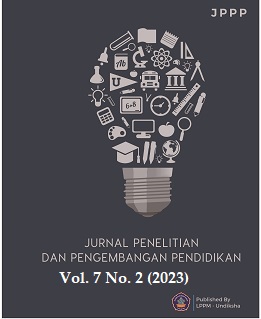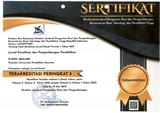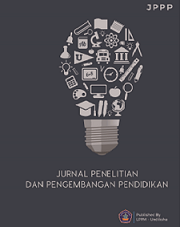Nurturing Pre-Service and In-Service Education as The Pathway to Fostering The Teacher Leadership Skills
DOI:
https://doi.org/10.23887/jppp.v7i2.62156Keywords:
Pre-Service Education, In-Service Education, Leadership, Teacher ProfessionalismAbstract
Professional development is claimed by teachers as urgent, considering that the profession itself refers to a concrete manifestation of a combination of educational legislation, pedagogical theory, and practice in schools. This research aims to analyze the effect of pre-service and in-service education on teacher professionalism. This type of research is qualitative. This study uses a mixed methods approach with a concurrent transformative strategy model. The population includes 251 school principals. The sampling technique used was convenience sampling by distributing questionnaires to 202 returning schools. Data was collected through questionnaires, written tests, interviews, and document studies. Data analysis used Structural Equation Modeling (SEM) and interpretive descriptive models. The results of the data analysis are; first, the influence of pre-service education is significant and positive on teacher leadership. Likewise, the effect on professionalism was also substantial and positive. Second, in-service education is known to significantly and positively impact teacher leadership and professionalism. Third, teacher leadership was found to significantly and positively affect professionalism. It was concluded that pre and service education completely and significantly affected professionalism through teacher leadership. The results of this study can be used as a guideline for increasing teacher professionalism in terms of leadership.
References
Ado, K. (2016). From Pre-Service to Teacher Leader the Early Development of Teacher Leaders. Issues in Teacher Education, 25(1). https://eric.ed.gov/?id=ej1100422.
Akert, N., & Martin, B. N. (2012). The Role of Teacher Leaders in School Improvement through the Perceptions of Principals and Teachers. International Journal of Education, 4(4). https://doi.org/10.5296/ije.v4i4.2290. DOI: https://doi.org/10.5296/ije.v4i4.2290
Alexander, C., Wyatt-Smith, C., & Du Plessis, A. (2020). The role of motivations and perceptions on the retention of inservice teachers. Teaching and Teacher Education, 96. https://doi.org/10.1016/j.tate.2020.103186. DOI: https://doi.org/10.1016/j.tate.2020.103186
Amrulloh, M. S., & Galushasti, A. (2022). Professional development teacher to improve skills of science process and creativity of learners. Journal of Education and Learning (EduLearn), 16(3), 299–307. https://doi.org/10.11591/edulearn.v16i3.20404. DOI: https://doi.org/10.11591/edulearn.v16i3.20404
Andina, E., & Arifa, F. N. (2021). Problems of Selection and Recruitment of Government Teachers in Indonesia. Aspirations: Journal of Social Issues, 12(1), 85–105. https://doi.org/10.35445/alishlah.v13i3.1441. DOI: https://doi.org/10.46807/aspirasi.v12i1.2101
Anwar, A. S. (2020). Development of Teacher Professionalism Through Teacher Performance in the MTs Negeri 1 Serang Educational Unit. Andragogy: Journal of Islamic Education and Management of Islamic Education, 2(1), 147–173. https://doi.org/10.36671/andragogi.v1i3.66. DOI: https://doi.org/10.36671/andragogi.v2i1.79
Baharin, B., Adnan, M. H., Mohd Zin, M. H., Kamaludin, M. N., & Mansor, A. N. (2016). Professor leadership style and teacher efficacy level. Journal of Personalized Learning, 9–17. http://eprints.iab.edu.my/v2/id/eprint/1207.
Blumberg, F. C., & Fisch, S. M. (2013). Introduction: Digital games as a context for cognitive development, learning, and developmental research. New Directions for Child and Adolescent Development, 139, 1–9. https://doi.org/10.1002/cad.20026. DOI: https://doi.org/10.1002/cad.20026
Cheng, E. W. L. (2016). Maintaining the transfer of in-service teachers’ training in the workplace. Educational Psychology, 36(3). https://doi.org/10.1080/01443410.2015.1011608. DOI: https://doi.org/10.1080/01443410.2015.1011608
Cisneros-Cohernour, E. J. (2021). The key role of administrators in supporting teacher leadership and professionalism in southern Mexico. Research in Educational Administration and Leadership, 6(1). https://doi.org/10.30828/real/2021.1.10. DOI: https://doi.org/10.30828/real/2021.1.10
Coley, R. J., Goertz, M. E., & Wilder, G. Z. (2013). Contributions of a Nonprofit Educational Measurement Organization to Education Policy Research. ETS Research Report Series, 2013(1), i–34. https://doi.org/10.1002/j.2333-8504.2013.tb02313.x. DOI: https://doi.org/10.1002/j.2333-8504.2013.tb02313.x
Cook, J. W. (2014). Sustainable School Leadership: The Teachers’ Perspective. International Journal of Educational Leadership Preparation, 9(1), 1. https://eric.ed.gov/?id=EJ1024112.
Demirkasımoğlu, N. (2010). Defining “Teacher Professionalism” from different perspectives. Procedia-Social and Behavioral Sciences, 9, 2047–2051. https://doi.org/10.1016/j.sbspro.2010.12.444. DOI: https://doi.org/10.1016/j.sbspro.2010.12.444
Dinh, J. E., Lord, R. G., Gardner, W. L., Meuser, J. D., Liden, R. C., & Hu, J. (2014). Leadership theory and research in the new millennium: Current theoretical trends and changing perspectives. The Leadership Quarterly, 25(1), 36–62. https://doi.org/10.1016/j.leaqua.2013.11.005. DOI: https://doi.org/10.1016/j.leaqua.2013.11.005
Dreer, B., Dietrich, J., & Kracke, B. (2017). From in-service teacher development to school improvement: factors of learning transfer in teacher education. Teacher Development, 21(2). https://doi.org/10.1080/13664530.2016.1224774. DOI: https://doi.org/10.1080/13664530.2016.1224774
Duţă, N., & Rafailă, E. (2014). Importance of the Lifelong Learning for Professional Development of University Teachers – Needs and Practical Implications. Procedia - Social and Behavioral Sciences, 127. https://doi.org/10.1016/j.sbspro.2014.03.358. DOI: https://doi.org/10.1016/j.sbspro.2014.03.358
Ekosusilo, M. (2016). Contribution of education level, upgrading, and KKG activities to improving teacher professional skills. Journal of Education Science, 10. https://doi.org/10.17977/jip.v10i1.128.
Ferreira, J. A., Ryan, L., & Davis, J. (2015). Developing Knowledge and Leadership in Pre-Service Teacher Education Systems. Australian Journal of Environmental Education, 31(2), 194–207. https://doi.org/10.1017/aee.2015.24. DOI: https://doi.org/10.1017/aee.2015.24
Freeman, A., Becker, S. A., & Cummins, M. (2017). NMC/CoSN horizon report: 2017 K. The New Media Consortium.
Gore, J., Lloyd, A., Smith, M., Bowe, J., Ellis, H., & Lubans, D. (2017). Effects of professional development on the quality of teaching : Results from a randomised controlled trial of Quality Teaching Rounds. Teaching and Teacher Education, 68, 99–113. https://doi.org/10.1016/j.tate.2017.08.007. DOI: https://doi.org/10.1016/j.tate.2017.08.007
Gore, J. M., Miller, A., Fray, L., Harris, J., & Prieto, E. (2021). Improving student achievement through professional development: Results from a randomised controlled trial of Quality Teaching Rounds. Teaching and Teacher Education, 101. https://doi.org/10.1016/j.tate.2021.103297. DOI: https://doi.org/10.1016/j.tate.2021.103297
Gupta, A., & Lee, G. L. (2022). Making a Difference Through Sustained In-Service Teacher Training. International Education Studies, 15(1). https://doi.org/10.5539/ies.v15n1p148. DOI: https://doi.org/10.5539/ies.v15n1p148
Hasnawati, Niswatul, B., & Oktavianti, I. (2021). Analisis Hubungan Keterampilan Berpikir Kritis Dengan Kecenderungan Berpikir Kritis Mahasiswa Calon Guru Sekolah Dasar. Jurnal Syntax Transformation, 2(6), 768–773. https:// doi.org/10.46799/jurnal syntax transformation.v2i6. DOI: https://doi.org/10.46799/jst.v2i6.305
Jacobs, J., Gordon, S. P., & Solis, R. (2016). Critical issues in teacher leadership: A national look at teachers’ perception. Journal of School Leadership, 26(3), 374–406. https://doi.org/10.1177/105268461602600301. DOI: https://doi.org/10.1177/105268461602600301
Jacques, C., Weber, G., Bosso, D., Olson, D., & Bassett, K. (2016). Great to Influential: Teacher Leaders’ Roles in Supporting Instruction. American Institutes for Research.
King, F., McMahon, M., Nguyen, D., & Roulston, S. (2019). Leadership learning for pre-service and early career teachers: insights from Ireland and Scotland. International Studies in Educational Administration, 47(2), 6–22. https://pure.ulster.ac.uk/en/publications.
Kılınç, A. Ç., Cemaloğlu, N., & Savaş, G. (2015). The Relationship Between Teacher Leadership, Teacher Professionalism, and Perceived Stress. Eurasian Journal of Educational Research, 15(58). https://doi.org/10.14689/ejer.2015.58.5. DOI: https://doi.org/10.14689/ejer.2015.58.5
Lai, E., & Cheung, D. (2015). Enacting teacher leadership:The role of teachers in bringing about change. Educational Management Administration & Leadership, 43(5). https://doi.org/10.1177/1741143214535742. DOI: https://doi.org/10.1177/1741143214535742
Leonard, L. (2016). Kompetensi Tenaga Pendidik di Indonesia: Analisis Dampak Rendahnya Kualitas SDM Guru dan Solusi Perbaikannya. Formatif: Jurnal Ilmiah Pendidikan MIPA, 5(3), 192–201. https://doi.org/10.30998/formatif.v5i3.643. DOI: https://doi.org/10.30998/formatif.v5i3.643
Livingston, K. (2016). Teacher education’s role in educational change. In European Journal of Teacher Education (Vol. 39, Issue 1). https://doi.org/10.1080/02619768.2016.1135531. DOI: https://doi.org/10.1080/02619768.2016.1135531
Mahmuda, M. (2016). Development of Guidelines for in Service Training in the 2013 Curriculum through the KKG-PAI in Improving the Professionalism of PAI Teachers in Panji Situbondo District. Indonesian Journal of Islamic Education, 1(1), 21–31. https://doi.org/10.35316/jpii.v1i1.34. DOI: https://doi.org/10.35316/jpii.v1i1.34
Mahulae, A. V., Lumbanraja, P., & Siahaan, E. (2020). Effect of Professionalism and Competence of Teachers on Teacher Performance and Its Impact on Student Learning Outcomes at Harapan Mandiri College. International Journal of Research and Review, 7(11). https://www.mak.ac.ug/documents/Makfiles/theses/Nabukenya_Margaret.pdf.
Mohamed, A., Abdul Razak, A. Z., & Abdullah, Z. (2018). Teacher Leadership and Teacher Professional Learning in Schools of Maldives. International Online Journal of Educational Leadership, 2(2). https://doi.org/10.22452/iojel.vol2no2.4. DOI: https://doi.org/10.22452/iojel.vol2no2.4
Ornstein, A. C., Levine, D. U., Gutek, G., & Vocke, D. E. (2016). Foundations of education. Cengage learning.
Osamwonyi, E. F. (2016). In-Service Education of Teachers: Overview, Problems and the Way Forward. Journal of Education and Practice, 7(26), 83–87. https://eric.ed.gov/?id=EJ1115837.
Pang, N. S., & Miao, Z. (2017). The roles of teacher leadership in shanghai education success. Current Business and Economics Driven Discourse and Education: Perspectives from Around the World, 15, 93–100. https://eric.ed.gov/?id=ED574221.
Parlar, H., Cansoy, R., & Kılınç, A. Ç. (2017). Examining the Relationship between Teacher Leadership Culture and Teacher Professionalism: Quantitative Study. Journal of Education and Training Studies, 5(8). https://doi.org/10.11114/jets.v5i8.2499. DOI: https://doi.org/10.11114/jets.v5i8.2499
Potolea, D., & Toma, S. (2015). The Dynamic and Multidimensional Structure of the Teachers Professional Development. Procedia - Social and Behavioral Sciences, 180. https://doi.org/10.1016/j.sbspro.2015.02.093. DOI: https://doi.org/10.1016/j.sbspro.2015.02.093
Purwantiningsih, A., & Suharso, P. (2019). Improving Teacher Professionalism Toward Education Quality in Digital Era. Journal of Physics: Conference Series, 1254(1), 12019. https://doi.org/10.1088/1742-6596/1254/1/012019. DOI: https://doi.org/10.1088/1742-6596/1254/1/012019
Rahmatullah, A. S., Mulyasa, E., Syahrani, S., Pongpalilu, F., & Putri, R. E. (2022). Digital era 4.0: The Contribution to Education and Student Psychology. Linguistics and Culture Review, 6, 89–107. https://doi.org/10.21744/lingcure.v6nS3.2064. DOI: https://doi.org/10.21744/lingcure.v6nS3.2064
Reeves, T. D., & Lowenhaupt, R. J. (2016). Teachers as leaders: Pre-service teachers’ aspirations and motivations. Teaching and Teacher Education, 57, 176–187. https://doi.org/10.1016/j.tate.2016.03.011. DOI: https://doi.org/10.1016/j.tate.2016.03.011
Ridho, S. (2014). Strategy to Improve Teacher Professionalism through Inservice Training Education. AT-TURAS: Journal of Islamic Studies, 1(1). https://doi.org/10.33650/at-turas.v1i1.154.
Subandi, S. (2018). Kontribusi Kepemimpinan Kepala Sekolah, Motivasi Kerja,dan Iklim Sekolah terhadap Kinerja Guru. Jurnal Penelitian Dan Pengembangan Sains Dan Humaniora, 1(2), 57–63. https://doi.org/10.23887/jppsh.v1i2.12934. DOI: https://doi.org/10.23887/jppsh.v1i2.12934
Suhartini, S., Milfayetty, S., & Rahman, A. (2021). The Effect of Teacher Professionalism and Competency on the Quality of Education in the City of Langsa. Budapest International Research and Critics Institute (BIRCI-Journal): Humanities and Social Sciences, 4(2). https://doi.org/10.33258/birci.v4i2.1921. DOI: https://doi.org/10.33258/birci.v4i2.1921
Supriyono, S. (2019). Teachers’ Profesionalism and Challenges in Industrial Revolution Era 4.0. Social, Humanities, and Educational Studies (SHEs): Conference Series, 2(1), 195. https://doi.org/10.20961/shes.v2i1.37645. DOI: https://doi.org/10.20961/shes.v2i1.37645
Susanto, H., Sasongko, R. N., & Kristiawan, M. (2021). Teachers ’Professionality in Improving the Quality of Madrasah Education in The Era of Globalization. Journal of Teacher Studies and Learning, 4(1), 135–141. https://doi.org/10.30605/jsgp.4.1.2021.551. DOI: https://doi.org/10.30605/jsgp.4.1.2021.551
Syaiful, S. (2020). Professional abilities of teachers and education personnel (4th ed.). Alfabeta.
Tanang, H., & Abu, B. (2014). Teacher Professionalism and Professional Development Practices in South Sulawesi, Indonesia. Journal of Curriculum and Teaching, 3(2), 25–42. https://eric.ed.gov/?id=EJ1157754. DOI: https://doi.org/10.5430/jct.v3n2p25
Tarchi, C., Brante, E. W., Jokar, M., & Manzari, E. (2022). Pre-service teachers’ conceptions of online learning in emergency distance education: How is it defined and what self-regulated learning skills are associated with it? Teaching and Teacher Education, 113. https://doi.org/10.1016/j.tate.2022.103669. DOI: https://doi.org/10.1016/j.tate.2022.103669
Tasdemir, M., Iqbal, Z., & Asghar, Z. (2020). A Study of the Significant Factors Affecting Pre-Service Teacher Education in Turkey A Study of the Significant Factors Affecting Pre-Service TE in Turkey Background of the Study. Bulletin of Education and Research, 42(1). https://eric.ed.gov/?id=EJ1258047.
Tufail, S., & Farooq, M. S. (2021). Effect of Teachers’ Professionalism on Classroom Engagement at Primary School Level. 43(229), 247–254. https://eric.ed.gov/?id=EJ1320632.
Tyaningsih, A. R., Suryadi, S., & Rahmawati, D. (2021). Self-Efficacy, Teacher Leadership and Teacher Professionalism in Secondary School. Journal of Iqra’: Educational Studies, 6(2). https://doi.org/10.25217/ji.v6i2.1331. DOI: https://doi.org/10.25217/ji.v6i2.1331
Veenman, S., Van Tulder, M., & Voeten, M. (1994). The impact of inservice training on teacher behaviour. Teaching and Teacher Education, 10(3). https://doi.org/10.1016/0742-051X(93)E0001-8. DOI: https://doi.org/10.1016/0742-051X(93)E0001-8
Walker, V. L., Pennington, R. C., Andzik, N. R., Tapp, M. C., & Masud-Werner, A. (2022). Preservice Teachers’ Preparation in Communication Instruction for Students with Extensive Support Needs. Research and Practice for Persons with Severe Disabilities, 47(1). https://doi.org/10.1177/15407969221074720. DOI: https://doi.org/10.1177/15407969221074720
Warren, L. L. (2021). The importance of teacher leadership skills in the classroom. Education Journal, 10(1), 8–15. https://doi.org/doi: 10.11648/j.edu.20211001.12. DOI: https://doi.org/10.11648/j.edu.20211001.12
Weiss, S., Markowetz, R., & Kiel, E. (2018). How to teach students with moderate and severe intellectual disabilities in inclusive and special education settings: Teachers’ perspectives on skills, knowledge and attitudes. European Educational Research Journal, 17(6), 837–856. https://doi.org/10.1177/1474904118780171. DOI: https://doi.org/10.1177/1474904118780171
Wenner, J. A., & Campbell, T. (2017). The Theoretical and Empirical Basis of Teacher Leadership: A Review of the Literature. Review of Educational Research, 87(1), 134–171. https://doi.org/10.3102/0034654316653478. DOI: https://doi.org/10.3102/0034654316653478
Xu, Y., & Patmor, G. (2012). Fostering Leadership Skills in Pre-Service Teachers. International Journal of Teaching and Learning in Higher Education, 24(2). https://eric.ed.gov/?id=EJ996270.
Downloads
Published
How to Cite
Issue
Section
License
Copyright (c) 2023 Arwildayanto

This work is licensed under a Creative Commons Attribution-ShareAlike 4.0 International License.
Authors who publish with the Jurnal Penelitian dan Pengembangan Pendidikan agree to the following terms:
- Authors retain copyright and grant the journal the right of first publication with the work simultaneously licensed under a Creative Commons Attribution License (CC BY-SA 4.0) that allows others to share the work with an acknowledgment of the work's authorship and initial publication in this journal.
- Authors are able to enter into separate, additional contractual arrangements for the non-exclusive distribution of the journal's published version of the work (e.g., post it to an institutional repository or publish it in a book), with an acknowledgment of its initial publication in this journal.
- Authors are permitted and encouraged to post their work online (e.g., in institutional repositories or on their website) prior to and during the submission process, as it can lead to productive exchanges, as well as earlier and greater citation of published work. (See The Effect of Open Access)








